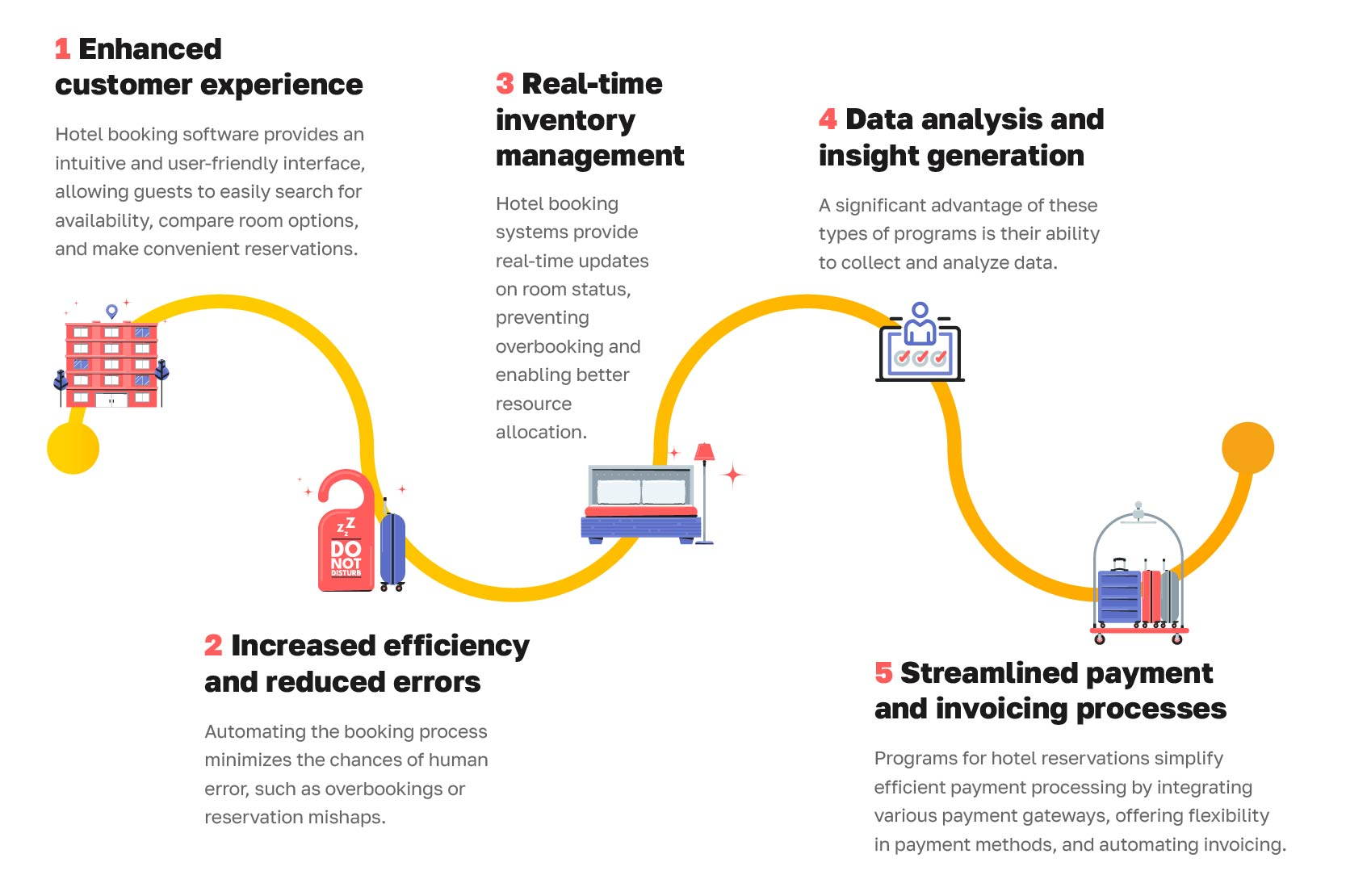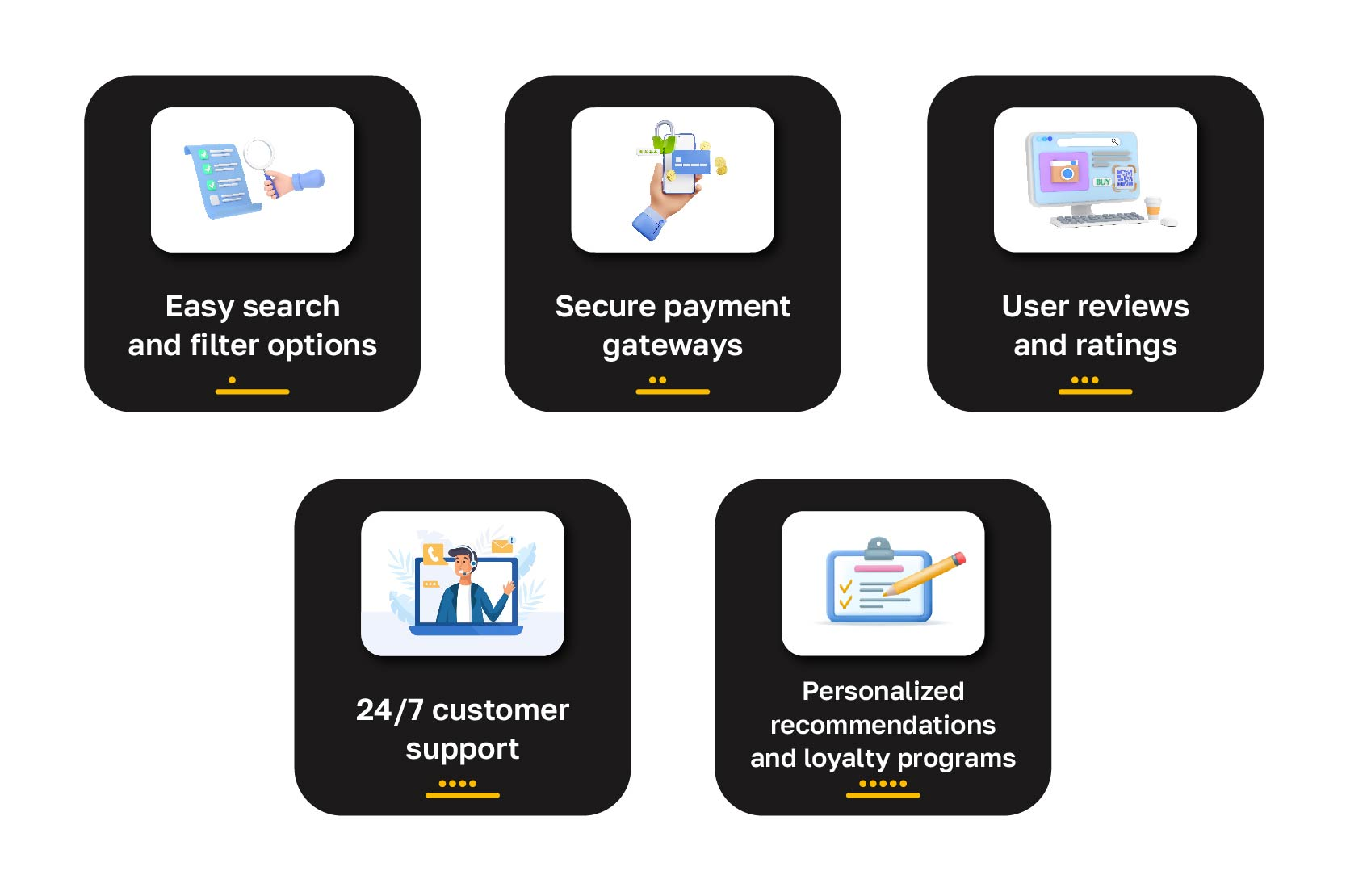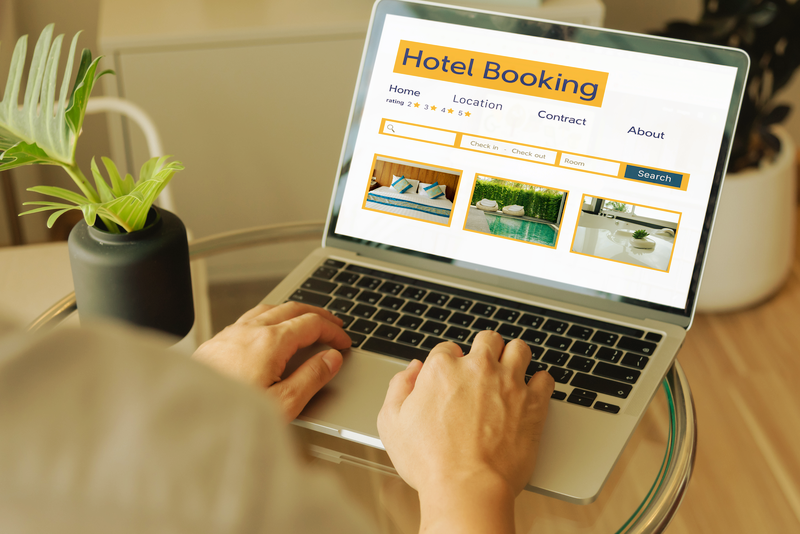Do you dream of launching a groundbreaking hotel booking app? The development process involves various challenges, like understanding your target market and choosing the right technological tools. The frustration of piecing together the perfect formula for success can leave you feeling stuck, overwhelmed, and questioning whether your vision will ever come to reality.
The struggle to create an engaging and user-friendly hotel booking mobile app is common. However, we always stay up to date with software development trends like these and have some insights and strategies that have propelled countless successful projects. Keep reading to learn how to execute a successful hotel booking app development!
What Is Hotel Booking App Development?
Hotel booking app development refers to designing, building, and launching a mobile application that allows users to find, compare, and reserve hotel rooms. This digital solution, offered by any hotel app development company, caters to modern travelers seeking convenience, speed, and various choices at their fingertips.
What Are the Benefits of Hotel Booking Software?
Implementing hotel booking software can transform any hospitality business’s operational efficiency and customer experience. It’s a popular business strategy, offering various benefits. However, some advantages stand out from the rest.
Here are the five main benefits of hotel booking software:

#1 – Enhanced customer experience
Hotel booking software provides an intuitive and user-friendly interface, allowing guests to easily search for availability, compare room options, and make convenient reservations. This 24/7 accessibility significantly improves the experience, increasing customer satisfaction and loyalty.
#2 – Increased efficiency and reduced errors
Automating the booking process minimizes the chances of human error, such as overbookings or reservation mishaps. The software’s precision in managing bookings and availability ensures that operations run smoothly, allowing staff to focus on other aspects of guest service.
#3 – Real-time inventory management
One of the most critical aspects of hotel management is tracking room availability. Hotel booking systems provide real-time updates on room status, preventing overbooking and enabling better resource allocation. This real-time insight is invaluable for maintaining operational harmony and maximizing occupancy rates.
#4 – Data analysis and insight generation
A significant advantage of these types of programs is their ability to collect and analyze data. It can track booking trends, customer preferences, and revenue patterns, offering actionable insights to inform marketing strategies, pricing adjustments, and service enhancements.
#5 – Streamlined payment and invoicing processes
Programs for hotel reservations simplify efficient payment processing by integrating various payment gateways, offering flexibility in payment methods, and automating invoicing. This enhances the user experience and ensures financial transactions are handled securely.
What Are the Types of Hotel Booking Software?
Hotel booking software comes in many forms, each meeting different needs within the hospitality industry. Their approach to user interaction, integration capabilities, and scalability differ. Hoteliers must analyze these options and choose a system that aligns with their business model, enhances operational efficiency, and elevates the guest experience.
Here are three popular types of online hotel booking apps that all hotel owners should know:
#1 – Central reservation systems (CRS)
CRSs are designed for hotel chains and groups, providing a centralized platform to manage reservations across multiple properties. This type of software excels in streamlining operations, offering a complete view of occupancy, rates, and inventory across different locations. It facilitates efficient management of group bookings and ensures consistency in pricing and availability information.
#2 – Property management systems (PMS)
A PMS is the backbone of hotel operations, integrating various aspects of hotel management, like booking, front desk operations, and hotel maintenance. These systems are versatile, catering to the needs of individual hotels or small chains. They are critical in automating daily tasks, improving staff coordination, and enhancing guest services through detailed guest profiles and preferences.
#3 – Direct booking engines
Integrated into a hotel’s website, direct booking engines enable guests to make reservations directly with the hotel, skipping third-party intermediaries. This software offers guests a streamlined booking experience. They also enhance the hotel’s control over the booking process, reduce commission costs, and open direct communication channels with guests.

How to Ensure a Successful Hotel Booking App Development
Developing a successful hotel booking application works better when leveraging best practices. Below is an eight-step software development guide that provides a comprehensive framework to steer your hotel reservation app toward success:
#1 – Market research
Market research involves understanding your target audience’s preferences, behaviors, and unmet needs. This step should focus on gathering insights about the demographics, booking habits, preferred features, and pain points of potential users. Conducting surveys, analyzing market trends, and engaging with potential users through focus groups can reveal invaluable information.
#2 – Competitor analysis
A thorough competitor analysis highlights what competitors are doing right and where they fall short. This process involves evaluating competing apps’ features, user interfaces, customer reviews, pricing models, and market positioning. You can differentiate your app by identifying gaps in the market and offering unique value propositions that address users’ unmet needs.
#3 – Determine your goals
Your goals should align with your business objectives and user needs, encompassing user acquisition targets, revenue milestones, and desired market positioning. Well-defined goals serve as a roadmap, focusing on achieving specific outcomes and providing a benchmark for assessing progress and making informed adjustments.
#4 – Focus on UI/UX
A successful app should use UI/UX to offer an intuitive, engaging, and seamless navigation experience, minimizing friction and enhancing user satisfaction. This entails a clean, visually appealing design, logical flow, easy-to-use booking processes, and personalized features that cater to individual user preferences and behaviors.
#5 – Choose the right development team
The development team you choose can make or break your project. Selecting a team with a proven track record in app development is essential, particularly in the hospitality or e-commerce sectors. The ideal team should demonstrate a deep understanding of user behavior and UI/UX design principles, as well as the agility to adapt to feedback and evolving project requirements.
#6 – Select the technology stack
The tech stack is a combination of programming languages, frameworks, and tools used in development. Choosing the right stack involves considering app performance requirements, scalability, security, and compatibility with existing systems. Current tech trends and long-term maintenance considerations should inform the decision.
#7 – Develop & test
The development and testing phase is where your app comes to life. This stage requires meticulous attention to detail, ensuring that every aspect of the app is built to specifications. Rigorous testing, including unit testing, integration testing, and user acceptance testing, is crucial to identifying and rectifying bugs, improving performance, and ensuring the app meets industry standards.
#8 – Ongoing maintenance
Post-launch, ongoing maintenance is vital to ensure the app remains functional, secure, and relevant to user needs. This involves regular updates, bug fixes, security enhancements, and adding new features based on user feedback and technological advancements.
What Are the Essential Features of a Successful Hotel Booking App?
A successful hotel booking app includes:

When Should You Consider Hotel Booking App Development?
Deciding when to develop a hotel booking app can be tricky. Timing can be the key to unlocking immense value for your hotel, and rapidly recognizing the signs that it’s time to develop one is crucial.
Here are three situations that should prompt you to consider app development:
#1 – Expansion of your hotel business
As your hotel business grows, whether through adding more properties or scaling the services of your existing establishment, the need for a cohesive and scalable booking system becomes apparent. A hotel booking app can centralize your operations, making managing multiple locations and services easier and providing a seamless experience for your guests, no matter which property they choose.
#2 – Need for direct bookings
If you find your hotel overly reliant on third-party booking platforms, consider a dedicated booking app. Direct bookings through your app will reduce commission fees paid to external platforms and allow you to build direct relationships with your guests, offering personalized experiences and promotions.
#3 – Demand for enhanced guest experience
The guest experience extends beyond the physical stay. Suppose your guests express the need for a more streamlined booking process, or you observe a gap in the market for providing a superior pre-arrival experience. In that case, a hotel booking app can be the solution.

We Can Help You Build a Robust Hotel Booking App!
Venturing into developing a hotel booking app alone can be an intimidating journey. The task demands a mastery of the technical nuances involved in app development, coupled with an ongoing commitment to maintenance and updates. The entire process can stretch your resources thin, diverting focus from your core hospitality operations and potentially compromising quality.
At WillDom, our software development outsourcing services are designed to help navigate the complexities of building a robust hotel booking app. With a team of seasoned professionals, we bring a wealth of knowledge in both the technological and hospitality sectors, ensuring your app is built on a solid foundation.
Contact WillDom today and entrust your vision to experts committed to translating your unique needs into a seamless, high-performing, and user-centric hotel booking app!
FAQ
Hotel booking apps are digital platforms where users can browse, compare, and reserve hotel rooms. These apps typically allow users to filter their search based on various criteria, such as location, price, amenities, and reviews. Once a user selects a room, they can often book and pay for it directly through the app, which then sends a confirmation to both the user and the hotel.
The cost of developing a hotel app can vary widely based on factors such as the app's complexity, the features it includes, the technology stack used, and the geographical location of the development team. It's essential to consult with app development professionals to get an accurate estimate based on your specific requirements.

